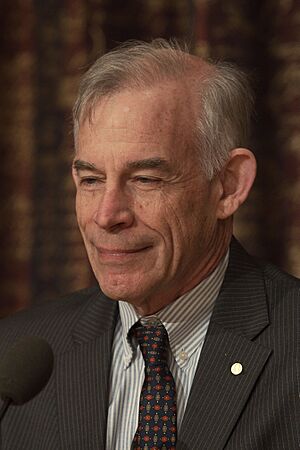Christopher A. Sims facts for kids
Quick facts for kids
Christopher A. Sims
|
|
|---|---|

Sims in 2011
|
|
| Born |
Christopher Albert Sims
October 21, 1942 |
| Nationality | American |
| Institution | Princeton University Yale University University of Minnesota Harvard University |
| Field | Macroeconomics Econometrics Time series |
| Doctoral advisor |
Hendrik S. Houthakker |
| Doctoral students |
Lars Peter Hansen Harald Uhlig |
| Contributions | Use of vector autoregression |
| Awards | Nobel Memorial Prize in Economic Sciences (2011) |
| Information at IDEAS / RePEc | |
Christopher Albert Sims (born October 21, 1942) is an American expert in econometrics and macroeconomics. Econometrics uses math and statistics to study economic data. Macroeconomics looks at how entire economies work. He is a professor of Economics at Princeton University. In 2011, he won the Nobel Memorial Prize in Economic Sciences with Thomas Sargent. They received the award for their research on how different parts of the economy affect each other.
Contents
About Christopher Sims
Sims was born in Washington, D.C. His father worked for the state department. His mother was a politician. Christopher Sims studied mathematics at Harvard University. He earned his first degree in 1963. He then got his PhD in economics from Harvard in 1968.
His Teaching Career
Sims taught at the University of Minnesota for 20 years. He also taught at Harvard and Yale University. Since 1999, he has been teaching at Princeton. This is where he has spent most of his career.
Awards and Memberships
Sims is a member of many important groups. These include the Econometric Society and the National Academy of Sciences. In 2011, he won the Nobel Memorial Prize in Economic Sciences. This is a very high honor for economists.
How He Helped Economics
Christopher Sims has written many important papers. His work focuses on econometrics and how economies behave. He helped make vector autoregression (VAR) popular. VAR is a tool that helps economists understand how different economic factors, like interest rates and prices, influence each other over time.
Understanding Economic Policies
Sims also supports using Bayesian statistics. This is a way of using probability to make better decisions. He believes it helps in creating and checking economic policies. He also helped develop the idea of the fiscal theory of the price level. This theory looks at how government spending and taxes can affect prices.
Views on Economic Ideas
Sims has shared his thoughts on other economic ideas. He has suggested that some complex economic theories should be seen as helpful notes. He thinks they are not deep problems for how we study the economy.
Recent Activities
In June 2024, Sims joined 15 other Nobel Prize winners in economics. They signed a letter about economic policies. They argued that certain policies could cause prices to rise in the United States.
The Nobel Prize
On October 10, 2011, Christopher A. Sims and Thomas J. Sargent received the Nobel Memorial Prize in Economic Sciences. They were honored for their research. This research helped us understand how cause and effect work in the economy.
His Nobel Lecture
Sims gave his Nobel lecture on December 8, 2011. It was called "Statistical Modeling of Monetary Policy and its Effects." He explained his work in simple terms. He said it helps figure out how central banks' money policies affect things.
His research confirmed that changes in the money supply can affect inflation. Inflation is when prices go up. But his work also showed that it works both ways. Things like interest rates and inflation can also cause changes in the money supply.
See also
 In Spanish: Christopher A. Sims para niños
In Spanish: Christopher A. Sims para niños

